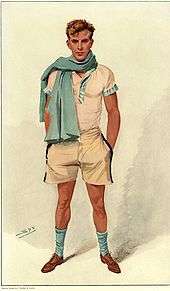Douglas Stuart (rower)

| Olympic medal record | ||
|---|---|---|
| Men's Rowing | ||
| | 1908 London | Men's eights |
Douglas Cecil Rees Stuart (1 March 1885 – 1969) was a British rower who competed in the 1908 Summer Olympics.
Stuart was the son of Montague Pelham Stuart, of Steynton, Surbiton and his wife Mary Rees. He was educated at Cheltenham College where he received his boating colours.[1] He rowed for Kingston Rowing Club and in 1903 at the age of 17 was runner up with C M Steele in the Silver Goblets at Henley Royal Regatta. Two years later in 1905 he partnered Charles Vincent Fox for the London Rowing Club, and they only just failed to win the Silver Goblets.[2]
Stuart went on to Trinity Hall, Cambridge. He won the Colquhoun Sculls and his Trinity Hall crew was head of the river in 1907. He stroked three successive Cambridge crews to victory in 1906, 1907 and 1908.[1] He was the strokeman of the Cambridge University boat in the eights, which won the bronze medal for Great Britain rowing at the 1908 Summer Olympics.[3] In 1909 his Trinity Hall crew were again Head of the River. He was president of the C.U.B.C. in 1909, but the crew lost to Oxford that year.
Stuart became a solicitor after taking a third class in the 1909 law Tripos.[1] In the First World War, he served with the First Battalion of the Border Regiment[4] and was badly wounded as a second lieutenant in the Battle of the Somme in July 1916.[5][6] He later served as a captain in the Courts Martial.[7] In 1920 he was appointed assistant chief clerk in the Solicitor's Department at the Inland Revenue.[8]
Stuart's elder brother Athol Alexander Stuart also rowed for Kingston Rowing Club and won the Single Sculls triple crown.
See also
References
- 1 2 3 The Rowers of Vanity Fair
- ↑ Henley Royal Regatta Results of Final Races 1839-1939
- ↑ Sports Reference Olympic Sports - Douglas Stuart
- ↑ Supplement to the London Gazette, 19 July 1916
- ↑ Border Regiment:1st Battalion in France
- ↑ H.C. Wyll (1924). The Border regiment in the great war. Printed and published for the regimental committee by Gale & Polden, Ltd. p. 88.
- ↑ British Courts Martial - The Corps of Royal Engineers - Robert Bell
- ↑ The London Gazette, 5 October 1920